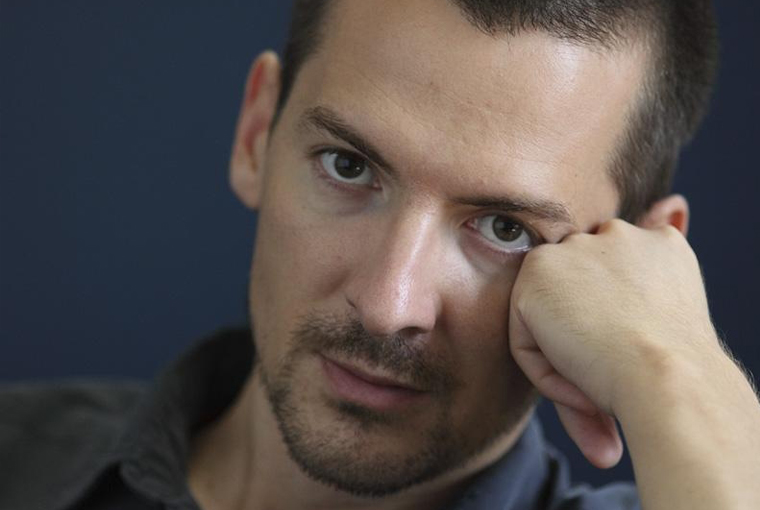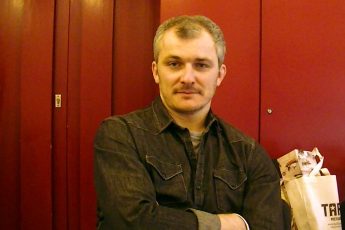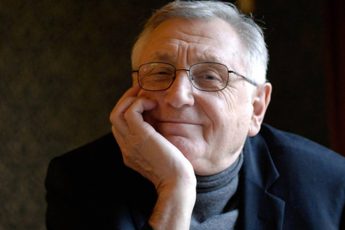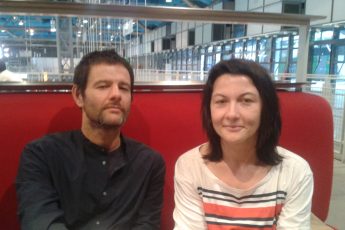
EEFB met Romanian director Bogdan Mirică at the Transilvana International Film Festival (May 27-June 5), where his latest feature “Dogs” was part of the main competition. Mirică speaks about his transition from screenwriter to director, the creative process and problems with mainstream storytelling.
What was it that made you decide to make the move from writing to directing?
Anger. I was angry at the people that I worked with. And it’s funny that this project was my first project which was not a comedy. Beforehand I wrote something like seven, eight feature films, two of which got produced. They were comedies, one of them was a really silly comedy, like a Christmas comedy, you know? One of those films were you have a kid, it’s Christmas and there’s a robbery and so on. Aside from that, I also wrote a TV series, a sitcom in Romania. But I was not happy with the end result. Of course I was scared, it’s always like this, you get scared by the tiniest and least significant details. So I decided to move to directing, and I thought “OK, I know I can write comedy, so I’m not going to write comedy.” But it’s true that sometimes I drift towards comedy and I’m trying to pull myself back and stick to what I want to do.
I wanted to ask about the scene in “Dogs” where the policeman removes a severed foot from a boot. At the screening at TIFF it caused a lot of laughter among the audience but it also had a lot of people hiding behind their hands.
I was actually in the last row and I didn’t see anything really. There was a lady next to me who got me really angry because she was checking her phone for half of the movie and only stopped to start eating, so I couldn’t focus on the movie and I couldn’t see the reactions. I had a movie here five years ago that was a comedy, and there I could totally connect with the audience because they would react very loudly and they were laughing and clapping. But when you have a movie like a thriller, you don’t really know if the people are feeling frightened or not, you just kind of hope that they enjoy it.
So you were aiming for that rather than for comedy?
Not necessarily, it’s just that comedy comes easy to me. So if it comes easy it doesn’t challenge me anymore, so I’m just trying to go somewhere I haven’t been before, and I’m trying to put myself in a tough position. I want to get something new out of it. For instance, last year we shot this TV series for HBO. I directed two episodes and I wrote the entire series, and the style is totally different from the style of my movie. We shot with three or five cameras. It’s very edgy, very modern, very urban. I could have shot like this, but I decided I’m going to go for the classical way, with really long tracking shots and so on. So, I’m just adapting to the context. I set up some rules and the stylistic approach, but I’m not crazy about it and don’t obey it to the letter. They are my rules, so if I want to override them, I do it as long as I can stick to the main style of the work.
You’ve said that the starting point for “Dogs” was a certain atmosphere you experienced as a child…
Yeah, it was a feeling. The random violence that I experienced, that I saw and experienced in the countryside. I remember that it scared me a lot, and I saw people covered in blood, people fighting with hatchets and axes and so on. But this was not the scariest part. The scariest part was that there was no cause, there was no goal, it was just their language. So where there is no causality, you can’t really predict what’s going to happen, and I think this is scary. How can you protect yourself against something that is random? So this was a feeling that stayed with me for a long time.
And is that generally how you like to work? To start with one idea and build from that?
I think the idea is the second stage. What I start from is just a feeling that’s very present in me, a feeling that I know has legs that are strong enough to carry me for a couple of years. Right now, if I tried to pick a random feeling like jealousy, I’m not sure I have enough stamina and interest in it to spend my next four years writing a movie about it. Maybe I am, maybe I can put a twist on it and make it darker or funnier or whatever. But with this fear, I knew that it could last for four years.
What about your influences as a director? Lots of people have made connections with other films, but how many of them actually come from you?
Nothing, none of them come from me. When I was in Cannes I read some reviews and one of them was saying that my movie is a shitty version of No Country for Old Men, and another one was saying that it’s a very good Romanian New Wave version of No Country for Old Men, so they were the opposite. People say it’s a Western because it has wide shots, but my influences don’t really come from cinema, more from literature or music. Every time I write a project, I spend a lot of time beforehand doing a playlist and then I listen to that playlist for years, for as long as I’m involved in the project. In this case I’ve been listening to the same playlist for 5 years. It was really dark and depressing, it was Nick Cave and Warren Ellis, the soundtracks for The Proposition and The Assassination of Jesse James. I listened to something from Paris, Texas, and also to some dark jazz and dark classical music. I need something to put me in the right mood, to help me be coherent for all these nights when I arrive home and write. Because it’s very hard when you stay in your house – I’m writing in my house – and on the street you see people having fun or whatever. I just stay in my house and try to get in as dark a mood as possible. You have to induce the right state of mind, and music helps me a lot. As well as a lot of other things that I’m going to keep off record.
How do you react to the film being described as a Western?
I’m not even sure it’s a genre movie, it’s a hybrid of genres. I know that it has elements of a Western. Some of them are formal, like the way we shot. Some others are not that formal, like, for instance, the classical set up of three guys, like The Good, The Bad and The Ugly. I knew from the very beginning once I started with this premise that people were going to connect some dots, and not necessarily the right dots. But my challenge was to use this and to try to put a spin on things. So, I think it’s a mix of genres. It’s a Western, I think it’s a Noir, or a Neo-Noir, I think it’s a thriller and I think it has something of the realism of the Romanian New Wave, and I try to make it my own thing.
You also mentioned at the Q&A that you cut out a lot of scenes. Can you talk a bit about what they were and how you made the editing decisions?
It was a very, very elaborate process. I think I cut out an hour of the movie, and there were scenes that I really loved. The problem was that somehow I felt they were redundant. The movie was way more epic. It was three hours, it was huge, with a lot of stunts and a lot of animals. I mean, we shot with a hundred pigs and we had stunts with pigs… but I thought no, I want to make it more off-beat and edgier and I really like this thing of using ellipsis and trying to engage the audience. I know for a fact that some people are going to be unhappy with that, and they’re going to say “he didn’t have the scene and he fucked it up in the editing.” But I did have the scene. It was just my choice. Right now I think it was a good choice, but I’m going to put them on the DVD and people will see that I’m not lying and that I really shot these scenes. They’re great scenes, but I did it for the greater good. Hopefully.
I hate closure. I think we’ve somehow been deformed by mainstream movies. They give you all the dots you need to connect. So I thought, ok, I’m going to take out some dots, and let’s see if you can connect them now. Maybe it works or maybe it doesn’t for some people.
Thank you for the interview.




Leave a Comment